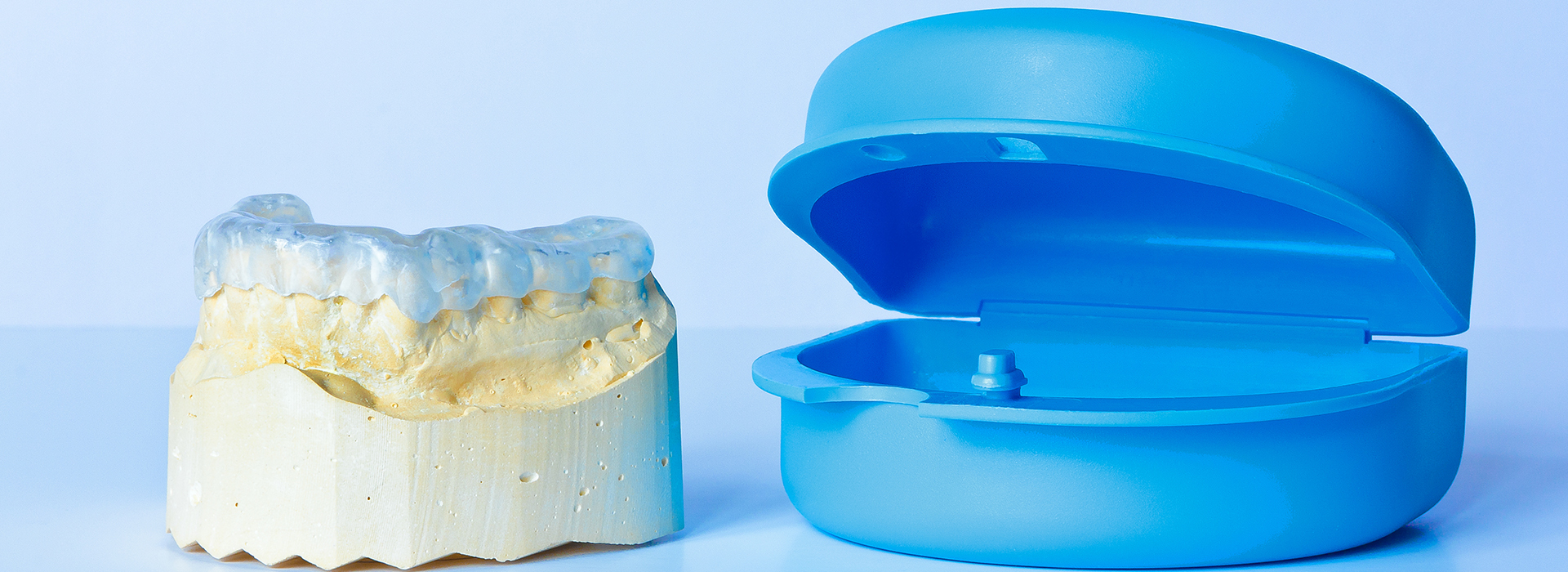New Patients
(865) 876-7050
Existing Patients
(865) 947-2220

Bruxism is the medical term for involuntary clenching or grinding of the teeth. It can occur during the day but frequently happens at night, when patients are unaware of their jaw activity. Over time, this repetitive force can wear enamel, fracture teeth, irritate gum tissue, and place undue stress on the temporomandibular joint (TMJ), which can lead to chronic jaw pain and headaches.
Night guards act as a protective barrier between the upper and lower teeth, absorbing and redistributing the pressure caused by grinding. Rather than stopping the habit outright, a properly fitted guard minimizes the physical consequences by preventing direct tooth-on-tooth contact and reducing the amount of strain delivered to the jaw muscles and joint.
Because bruxism often has multiple contributing factors — including stress, sleep disturbances, and bite alignment issues — night guards are most effective when used as part of a broader care plan. They are intended to protect oral structures while your dental team evaluates and addresses underlying causes.
Night guards are available in a range of materials and styles, from soft boil-and-bite trays sold in pharmacies to professionally fabricated appliances created from dental impressions. Over-the-counter guards can be a temporary measure for some patients, but they often lack the precision and durability of custom devices made in a dental lab.
A custom night guard begins with an accurate impression or a digital scan of the teeth, which ensures the appliance fits securely and distributes bite forces evenly. Lab fabrication allows the clinician to select material thickness and rigidity based on each patient’s grinding pattern and comfort needs — factors that directly affect performance and longevity.
Because every mouth is unique, a tailored night guard reduces the risk of creating new bite problems or increasing muscle strain. The custom approach also allows adjustments for patients who wear restorative work such as crowns or implants, ensuring the appliance protects both natural teeth and dental restorations.
Your initial appointment for a night guard typically involves a focused exam to evaluate wear patterns, joint health, and muscle tenderness. This assessment helps the clinician determine whether a night guard is appropriate and which type will be most beneficial for your needs. If imaging or further evaluation of the bite is needed, your dental team will explain the options clearly.
Next comes the impression or digital scan, which is quick and comfortable in an experienced practice. Digital impressions are often preferred because they are accurate and eliminate the need for messy putty material. Those scans or models are then used to fabricate an appliance that conforms closely to your dental anatomy.
Once your night guard arrives from the lab, the fitting appointment is focused on comfort and function. The dentist will check for even contact, make small adjustments to the appliance as needed, and provide guidance on how to insert and remove it. Follow-up visits are normal to fine-tune the fit and ensure the guard is performing as intended.
While the most immediate benefit of a night guard is reducing tooth wear and preventing chips or fractures, many patients notice additional advantages. Because night guards can lessen the intensity of jaw muscle contractions, some people experience fewer morning headaches and reduced facial muscle soreness, which can improve daily comfort and productivity.
Protecting the TMJ is another important outcome. By cushioning and stabilizing the bite, night guards can help prevent excessive joint loading that contributes to clicking, popping, and chronic jaw pain. For patients with early signs of TMJ strain, a night guard can be a conservative step toward reducing inflammation and improving joint function.
Finally, a well-made night guard can support restorative treatment plans. When dental restorations are present or planned, controlling bruxism with an effective appliance preserves those investments and reduces the likelihood of premature failure of crowns, bridges, or veneers.
Night guards require routine care to remain hygienic and effective. Rinse the appliance after each use and brush it gently with a soft toothbrush and nonabrasive toothpaste or mild soap. Store the guard in its ventilated case to prevent warping and avoid exposing it to heat. Regular cleaning prevents odor and bacterial buildup and extends the life of the device.
Over time, all night guards will show signs of wear; how long a guard lasts depends on material, how severe a patient’s grinding is, and whether it receives proper care. During regular dental checkups, your clinician will inspect the appliance for cracks, thinning, or changes in fit, and will recommend replacement or remaking when it no longer provides adequate protection.
Long-term management of bruxism is collaborative. Your dental team may pair a night guard with lifestyle strategies for managing stress, sleep assessments if a sleep disorder is suspected, or targeted occlusal adjustments when bite alignment contributes to symptoms. Periodic reassessment ensures the appliance continues to meet your needs as oral conditions change.
At Kennedy Dentistry, we focus on practical, patient-centered solutions for bruxism that protect oral health and support overall comfort. If you suspect you grind your teeth or are waking with jaw pain, our team will evaluate your symptoms and recommend the most appropriate night guard option.
To learn more about night guards and whether a custom appliance is right for you, please contact us for more information. We’re here to answer your questions and help you find the best path to lasting protection and relief.
